Bernanke Blamed, U.S. Economy Lost Revenues and Inflation /Deflation Fears
Economics / Economic Recovery Dec 10, 2009 - 11:44 AM GMTBy: Paul_L_Kasriel
 In the words of one of my favorite singer-song writers, Willie Nelson (another one of my favorites is Marisa Kasriel), I am on the road again. Forthwith are some thoughts that came to me as I listened to Willie on recent flights.
In the words of one of my favorite singer-song writers, Willie Nelson (another one of my favorites is Marisa Kasriel), I am on the road again. Forthwith are some thoughts that came to me as I listened to Willie on recent flights.
Did Bernanke Get Grilled for the Sins of Others?
Before hitting the "send" button on the hate email, let me tell you that Ben Bernanke is not an indispensable Fed chairman. I have no doubt that there are many people who could do a better job than he (but no one has called). Having said that, I was amused by some of the haranguing he was subjected to at his Senate confirmation hearing last week. Okay, now you can hit the "send" button.
As I have written previously, Bernanke's hands are not clean with respect to the primary cause of the recent financial and economic crisis. As a Fed governor, he never formally dissented from a Greenspan-led majority FOMC decision. In fact, then Governor Bernanke was a public cheerleader for Greenspan's easy credit policies of the early 2000s. But presumably, the recent Senate confirmation pertained to Bernanke's performance as chairman of the Fed, not his prior service as one of Greenspan's lieutenants. Should we not judge a Fed chairman's performance only on the things over which he has authority? It seemed to me that some of the criticism being directed at Bernanke should have more properly been directed at his predecessor. Moreover, some of the criticism would more appropriately been directed at his very inquisitors.
Now, I only watched long enough to see three senators' grillings. So, my viewing may not be a representative sample of the total hearing. One senator kept harping on the lack of regulatory discipline exercised by the Fed prior to the onset of the recent crisis. Given that the regulatory sins of omission occurred prior to Bernanke becoming Fed chairman on January 31, 2006, it seems unfair to blame him for that. Greenspan was in charge then. To the best of my knowledge, we do not have information as to how Bernanke voted, if votes were taken, on various relevant regulatory decisions. It was interesting that the senator I saw grilling Bernanke on the Fed's lack of regulatory discipline was also a senator who voted for the Gramm-Leach-Bliley Act of 1999, legislation that, among other things, repealed the Glass-Steagall Act of 1933. You remember the rationale of Gramm-Leach-Bliley, don't you? Innovation in our financial system was being stifled by too much regulation, such as Glass-Steagall. Senator, he who has not "sinned," shall cast the first stone.
Another senator harangued Bernanke about federal government entitlement spending. Admittedly, I have not read the Federal Reserve Act, but my suspicion is that nowhere in it does the Fed have any authority with regard to entitlement spending. So, why use a hearing for the confirmation of a Fed chairman to read him the riot act over runaway entitlement spending. I was curious to see if the senator who was so worked about entitlement spending had voted in favor of the last big increase in such spending - Medicare Part D. You guessed it - he had. Senator, heal thy own entitlement profligacy!
The Fed was authorized in 1913 in response to the Panic of 1907. There was no lender of last resort during the Panic of 1907. It was believed that such a lender of last resort could prevent financial market liquidity stringency from degenerating into an economy-wide depression. The lender-of-last-resort function was the Fed's raison d'etre. All right, so the Fed was a slow learner and we experienced the Great Depression in the early 1930s. But Ben Bernanke did learn. And although he may be making other mistakes, he did not make the mistake of the Fed in the early 1930s in performing its primary mission - lender of last resort to the financial system.
What Worries Small Businesses the Most?
Every month the National Federation of Independent Business (NFIB) surveys its constituents, small businesses, about various issues, among them, their single most important problem. Allegedly, small business hiring accounts for the largest part of job growth, so, if it is job growth that is paramount these days, we should pay attention to what is bugging small businesses the most. Is it taxes? Is it credit availability? Is it government regulation? Well, as shown in Chart 1, all of these issues have increased as perceived problems in the past year. It is interesting to note that taxes were perceived to be a problem by a greater percentage of respondents in 2007 than today. Government requirements (regulations) were as big a problem in June 2005 as it is today. And credit was a bigger problem in July 2006 than it is today.
Chart 1
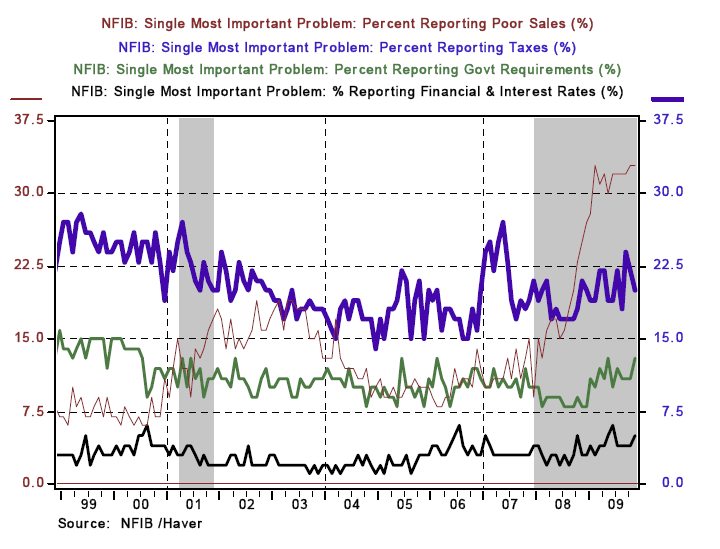
What is small businesses' biggest problem today? Chart 1 says poor sales. And what is the purpose of an expansionary monetary policy and a federal fiscal stimulus program? To stoke aggregate demand. And what is the logical outcome of stoked aggregate demand? Improved sales for small as well as big businesses.
Let's Not Forget Revenues
The federal government ran a deficit of $176.4 billion this past October. This compares with a deficit of only $155.5 billion in October 2008. So, between October 2008 and October 2009, the deficit widened by $20.8 billion. Infernal government spending, huh? No, as shown in Chart 2, the year-over-year change in total federal outlays was a decline of $8.7 billion. No, the deficit widened because of a $29.5 billion decline in total federal revenues.
Chart 2
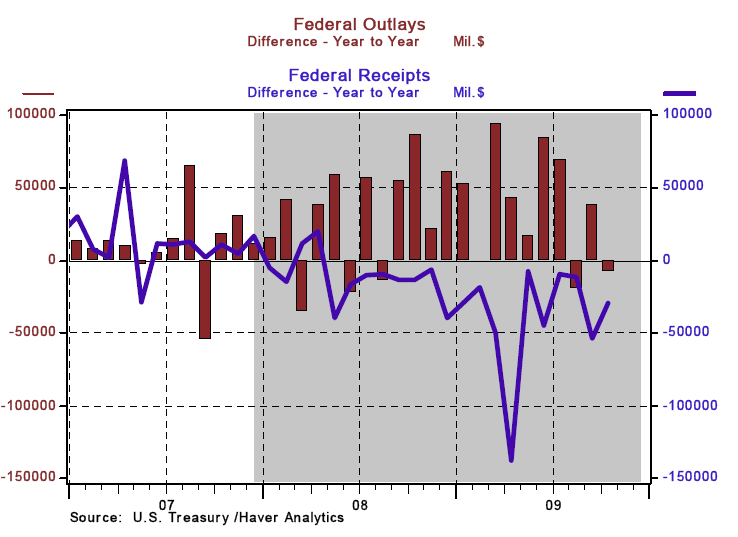
Over the first 10 months of 2009, the federal budget deficit has widened by $124.6 billion. Spending did contribute to this widening in the deficit. In the first 10 months of 2009, total federal outlays increased by $22.1 billion. But total federal revenues decreased by $102.5 billion (see Chart 3). Just as it takes two to tango, it takes two to make a deficit - expenditures and receipts. The data suggest that this year the biggest "driver" of a widening federal deficit is decreased revenues rather increased spending.
Chart 3
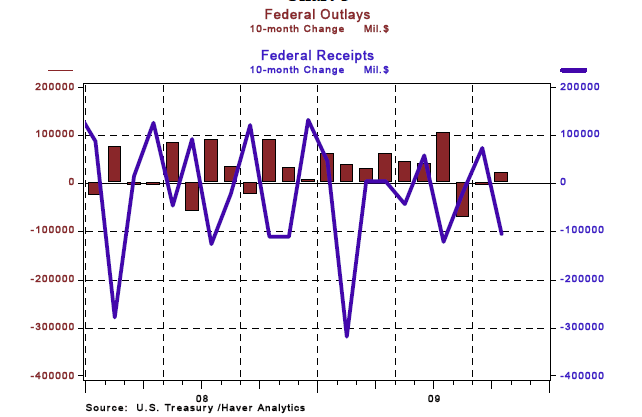
Why are revenues falling? Revenues always either fall or slow down in growth during and just after the end of recessions, as shown in Chart 4. Why? Household income growth slows and corporate profits fall in recessions. Sometimes there are tax cuts, too, as there were in 2001 and 2008-2009. Spending increases during recessions to pay for increased unemployment and food stamp benefits. This last recession was the longest and deepest of any in the post-era, so, of course revenues are down and spending is up. And, oh yes, we still are involved in some large scale military conflicts. That tends to increase total government spending, recession or not.
Chart 4
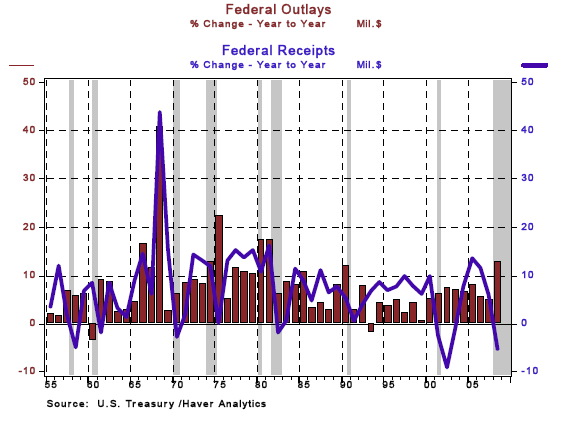
Inflation Expectations Have Risen - Should Investors Be Alarmed?
A proxy for a market-based measure of inflation expectations is the spread between the yield on a nominal Treasury security and the yield on a comparable maturity Treasury inflation-protected security (TIPS). If the annualized inflation rate over the specific maturity in question is equal to the yield spread, an investor breaks even over that time span by purchasing either the nominal security or the inflation-protected one. If the annualized inflation rate is higher than the spread, the investor would earn a higher inflation-adjusted return by purchasing the inflation-protected security and vice versa. This yield spread, then, is an approximation of market expectations of inflation. Chart 5 shows the behavior of this spread for a 10-year maturity.
Chart 5
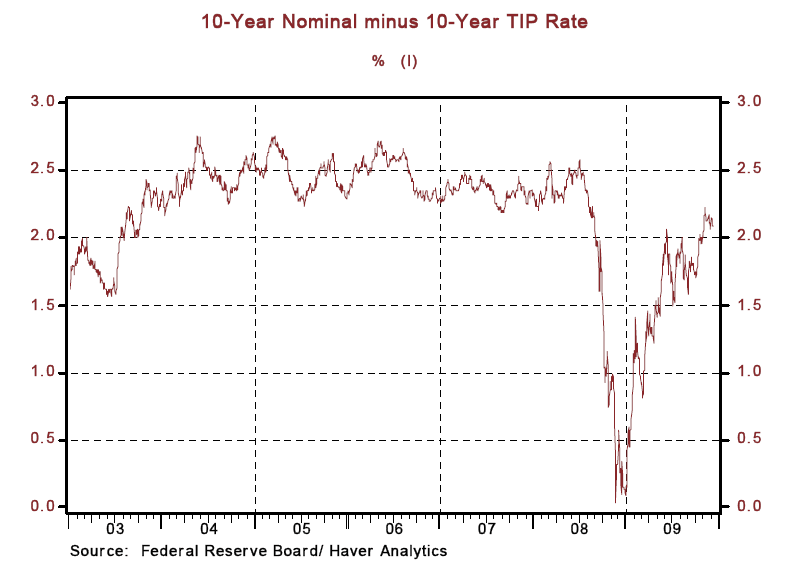
On November 20, 2008, this spread hit a low of 0.04%. That is, the market expectations of annualized inflation over the subsequent 10 years was, for all intents and purposes, zero. As of December 9, 2009, this spread had risen to 2.09%. As Chart 5 shows, the recent ascent in these inflation expectations was about as steep as was its descent in late 2008. As investors, should we be alarmed by this sharp reversal in inflation expectations?
So long as there is no anchor to our global monetary system, investors should always be on ready alert for increased inflation. But, I do not think we need to go to DEFCON 1 right now. Remember that after the mid-September 2008 Lehman failure, there were indications that the financial market liquidity crisis might precipitate another 1930s-type Great Depression, which would be accompanied by 1930s-type deflation. Hence, the decline in10-year inflation expectations to a level approaching zero. As shown in Chart 6, the ISM manufacturing production index fell to a post-war level of 26.3 in December 2008, reinforcing the notion of the advent of a deflationary depression. But also shown in Chart 6, there was a sharp reversal to the upside in the production index, sending the signal that a depression would be avoided. As a result, investors began discounting the likelihood of deflation. As signs of an economic recovery became more visible, investors began to anticipate a rate of inflation historically consistent with a modest recovery. Note from Chart 5 that the current level of 10-year inflation expectations remains below the level that prevailed prior to the Lehman failure. When the trend in the growth of the M2 money supply starts to head higher (see Chart 7), then investors should increase their inflation preparedness.
Chart 6
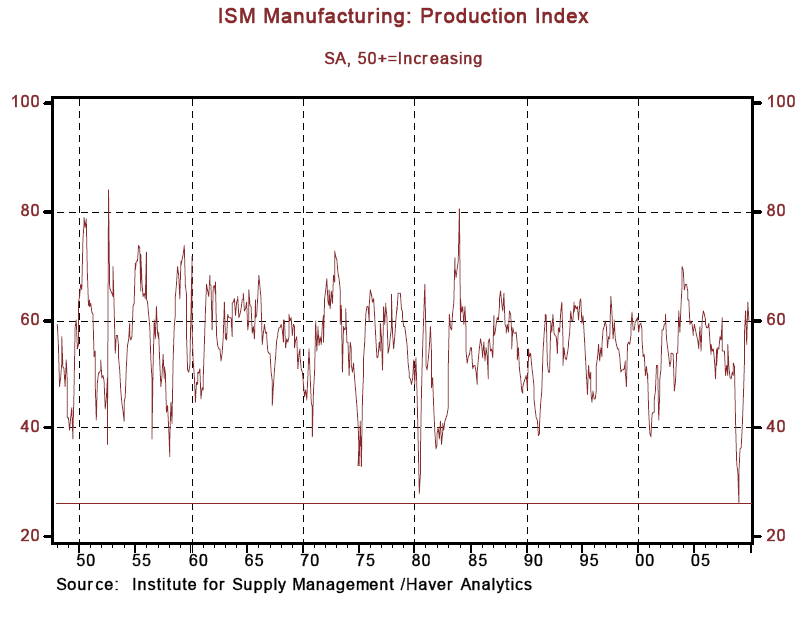
Chart 7
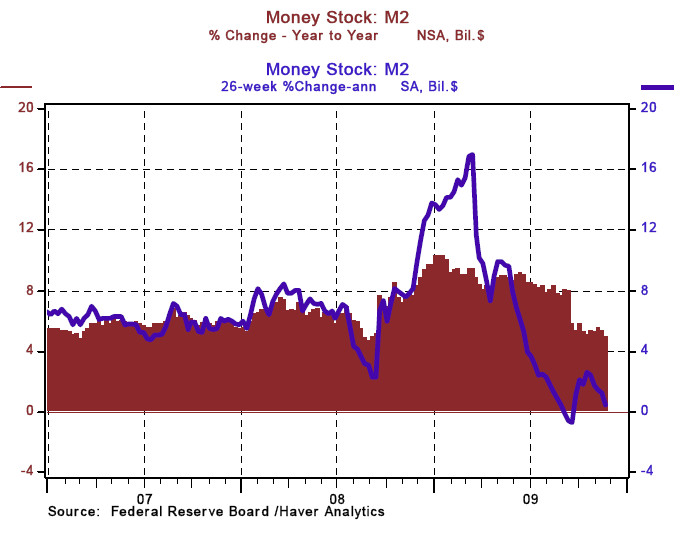
Be sure to see "Feed the Fish," the feel-good film of the winter, when it is released.
Paul Kasriel is the recipient of the 2006 Lawrence R. Klein Award for Blue Chip Forecasting Accuracy
By Paul L. Kasriel
The Northern Trust Company
Economic Research Department - Daily Global Commentary
Copyright © 2009 Paul Kasriel
Paul joined the economic research unit of The Northern Trust Company in 1986 as Vice President and Economist, being named Senior Vice President and Director of Economic Research in 2000. His economic and interest rate forecasts are used both internally and by clients. The accuracy of the Economic Research Department's forecasts has consistently been highly-ranked in the Blue Chip survey of about 50 forecasters over the years. To that point, Paul received the prestigious 2006 Lawrence R. Klein Award for having the most accurate economic forecast among the Blue Chip survey participants for the years 2002 through 2005.
The opinions expressed herein are those of the author and do not necessarily represent the views of The Northern Trust Company. The Northern Trust Company does not warrant the accuracy or completeness of information contained herein, such information is subject to change and is not intended to influence your investment decisions.
Paul L. Kasriel Archive |
© 2005-2022 http://www.MarketOracle.co.uk - The Market Oracle is a FREE Daily Financial Markets Analysis & Forecasting online publication.



